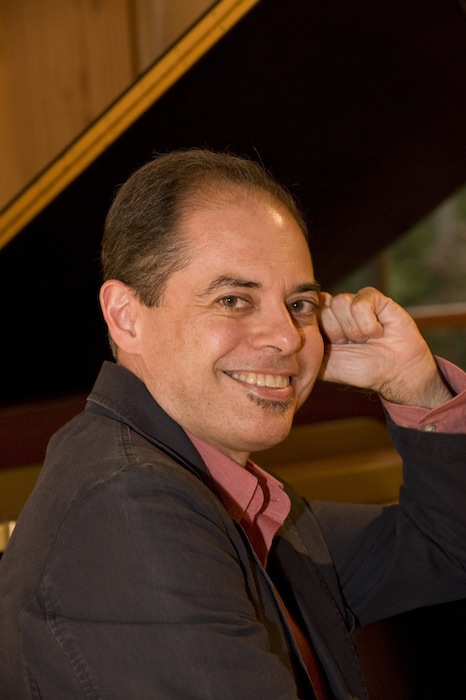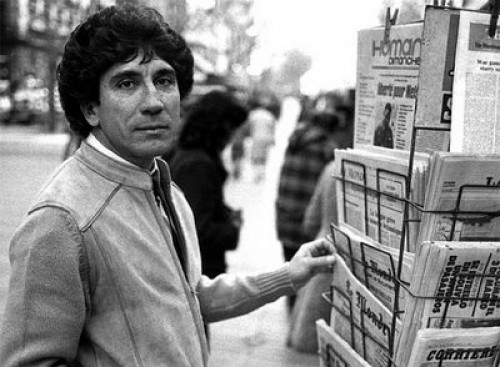FGO set to present operatic tale of exiled Cuban poet
After escaping from Cuba, the novelist and poet Reinaldo Arenas found himself at a Harvard banquet, talking to a German professor.
“In a way, I understand that you may have suffered in Cuba,” the professor said, between mouthfuls from a huge plate of food. “But I am a great admirer of Fidel Castro, and I am very happy with what he has done in Cuba.”
At this, Arenas, who had slaved on one of the regime’s hellish sugar plantations and spent time at the feared El Morro Castle prison, told the professor that in Cuba only government officials could enjoy as lavish a meal as he was eating. And then, he writes in this autobiography, he threw the professor’s plate against the wall.
Arenas, whose life in Cuba was destroyed because he was a gay man who dared publish abroad, is the hero of the opera Before Night Falls, which Florida Grand Opera will present starting Saturday at the Arsht Center in Miami. Written by the Cuban-American composer Jorge Martín, the opera draws on Arenas’ autobiography, written as he was dying of AIDS in New York. The opera is in English, with a few sections in Spanish.
With the opera’s themes of outsider status, the Castro regime and desperate refugees, the work falls into the category of “Made for Miami” operas that FGO has been producing since the arrival of its current general manager, Susan Danis, in 2012. But the opera itself aims for more universal themes of courage, personal integrity and defiance in the face of evil that Arenas displayed in his life.
“Obviously it doesn’t necessarily have a happy ending,” said Elliot Madore, the baritone who will sing the role of Arenas. “He dies tragically. But I think the idea that you fight for what you believe in and you stand up in the face of tyranny–for someone to do that under the conditions that he did that under, I think that’s for me a very life-affirming story. It’s a story of courage, of perseverance.”
The cast also includes Elizabeth Caballero, a Cuban-American FGO favorite who lives in South Florida, Dinyar Vania, Calvin Griffin, Michael Kuhn, Javier Abreu, Melissa Fajardo and Laura León. Directing is David Gately, who also helmed the original Fort Worth production.
As a youth, Arenas joined Castro’s revolution against the hated and corrupt Batista government. But like many other decent and humane men and women who had signed on to revolutions in Russia and China, he quickly detected the lies, self-interest and thuggery behind the slogans. Later, under communist rule, he lost his job as an editor when the government decreed that all gay people should be fired from cultural organizations.
The Castro government’s repression of gays is a chapter that many of the regime’s leftist admirers prefer to ignore—along with the chapters on one-party rule, the jailing of dissidents, the flooding of society with informants, economic failure and close alliance with the Soviet Union, the 20th century’s model totalitarian state.
Arenas, along with many other gay men, was sent to a labor camp, where he cut sugar cane under appalling conditions. Although the government would not allow publication of his works, he refused to be silenced and arranged for their publication abroad.
Arenas’ uninhibited autobiography is startlingly frank and jarring even today in its depiction of his prolific sexual appetites. From detailing his early encounters with a variety of farm animals, the poet goes on to calculate his subsequent love affairs and quick trysts, estimating that by 1968, his sexual conquests totaled 5,000 men.
And he is equally candid with his social and political opinions. Upon reaching the United States, he discovered that he hated Miami. “The typical Cuban machismo has attained alarming proportions in Miami,” he wrote. “I did not want to stay too long in that place, which was like a caricature of Cuba: the eternal gossip, the chicanery, the envy.”
Although Martín read the autobiography many years ago, he didn’t initially plan to make it into an opera. But friends who had read the book insisted it would make a great one, and he finally agreed. He contacted Arenas’ estate and then cowrote the libretto with Dolores M. Koch, who had translated Arenas’ autobiography into English. In a blog post written near the time of the opera’s Fort Worth premiere, he wrote that despite Arenas’ difficult and sometimes controversial life, his imprisonment, illness and suicide, his life represents a victory over the forces of repression and darkness.
“And that life also embodied what is for me one of the most compelling themes in some of my favorite operas: the fate of individuals caught in the sweep of history, enmeshed in and struggling against the historical time and place and condition they are born into,” said Martin.
“These individuals used to be often high-born — in Don Carlos, Boris Godunov, Aida, Dialogues of the Carmelites, and others — but Reinaldo Arenas is a commoner, in fact quite ‘low born,’ a guajiro from the Cuban countryside, who becomes a noted writer and runs right into the maw of history: Castro’s repressive regime demonizing and criminalizing homosexuals and dissident writers.”
Martín, who holds a doctorate in music composition from Columbia University, has spent his life saying that yes he was Cuban, but that didn’t mean he composed “Cuban” music. He has little interest in pursuing identity politics, the contemporary tendency to render people to heroes or villains on the basis of their demographic status. Unwilling to be reduced to a “Cuban composer” himself, he didn’t want to turn Arenas in a type, a poster child, a one-dimensional gay rights hero or Cuban freedom fighter.
“It was the story of this man and his spirit that an inspiring and universally appealing story,” he said. “One of the things that drew me to this character was that he was difficult to pigeonhole. The left didn’t like his anti-Castro stance, and the right didn’t like his being a very out homosexual. I love that kind of contradiction – not a contradiction for him, but in terms of people looking at the character, responding to him. On the left, you still have a lot of Castro-lovers who romanticize him. I think [the opera] might be rougher for elements of the left to take than for the right.”
It would be difficult, of course, to write a work set in Cuba without some nod to Cuban music. But even here, Martín was a pure composer first. “I opted for the less literal style of quotation, not so much quoting actual works as writing something that is Cuban sounding,” he said. “When Stravinsky would make a rag or a tango, it was entirely Stravinsky.”
Critics have been more impressed by the music than the libretto, which some found stiff and preachy.
“Martín’s libretto, created in collaboration with Arenas’ translator, Dolores M. Koch, is opera as sloganeering, for either political revolution or artistic freedom,” wrote Scott Cantrell of the Dallas Morning News, after the work’s 2010 world premiere at Fort Worth Opera. “The chorus thumps tubs with, “Death to traitors who fight against us! They are vile, they’re corrupt, they are evil!” Arenas’ mentor Ovidio sings, “Shout! Speak truth to their lies! Young ones, cultivate the power of words.”
Opera News, on the other hand, called it a “gripping tale of individual triumph over repressive brutality,” with “vibrant, compelling characters.”
Problematic librettos have never prevented an opera from achieving greatness, as admirers of bel canto know. The National Review’s Jay Nordlinger found the music highly effective, with its strains of Debussy, Bernstein and Strauss.
“The orchestration often has a beautiful sheen: transparent but not thin or barren,” he wrote. “And I will tell you something extraordinary: Before Night Falls is full of arias, duets, trios, and choruses. There are real, unabashed melodies and tunes. That is old-fashioned; indeed, it is well-nigh counterrevolutionary.”
Christopher Allen, the young Los Angeles-based conductor who will lead the performances, said the opera is full of imaginatively scored, richly colored music.
“It’s very melodic,” he said. “There are constant dance rhythms throughout. We have everything from the scenes of the Cuban countryside, with birds and insects. We have the dungeon prison scene, which is very stark. It’s very much like Debussy, Stravinsky, Bernstein, with a lot of Cuban flavor of Jorge.”
Among the highlights, he said, was a grim scene in El Morro Castle, the dank 17th century fortress where Arenas was locked up.
“The scene has this beautiful chorus,” Allen said. “He’s just been banished to the prison. The prisoners are basically saying when are they going to see the light of day, there’s heaviness and darkness in here. One of the lines is, ‘Life without freedom is no life at all.’ A couple minutes later there’s this beautiful aria. Basically Reinaldo is saying, ‘What fate has cast me so low?’ How long can he endure this prison. In that moment, the greatest part of that hell is that he can’t write and he can’t dream.”
In a suicide note sent to friends, Arenas wrote that he hoped and expected that Cuba would one day be free.
“I am satisfied to have contributed, though in a very small way, to the triumph of this freedom,” he wrote. “I end my life voluntarily because I cannot continue working. Persons near me are in no way responsible for my decision. There is only one person I hold accountable: Fidel Castro. The sufferings of exile, the pain of being banished from my country, the loneliness, and the diseases contracted in exile would probably never have happened if I had been able to enjoy freedom in my country.”
“I want to encourage the Cuban people out of the country as well as on the Island to continue fighting for freedom,” he continued. “I do not want to convey to you a message of defeat but of continued struggle and of hope. Cuba will be free. I already am.”
Florida Grand Opera’s production of Before Night Falls opens 7 p.m. Saturday and runs through March 25 at the Arsht Center in Miami. fgo.org; 800-741-1010.
Posted in Articles
Leave a Comment
Tue Mar 14, 2017
at 4:22 pm
No Comments

